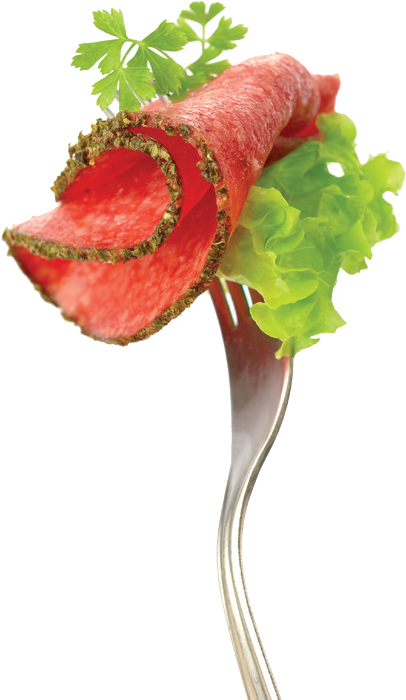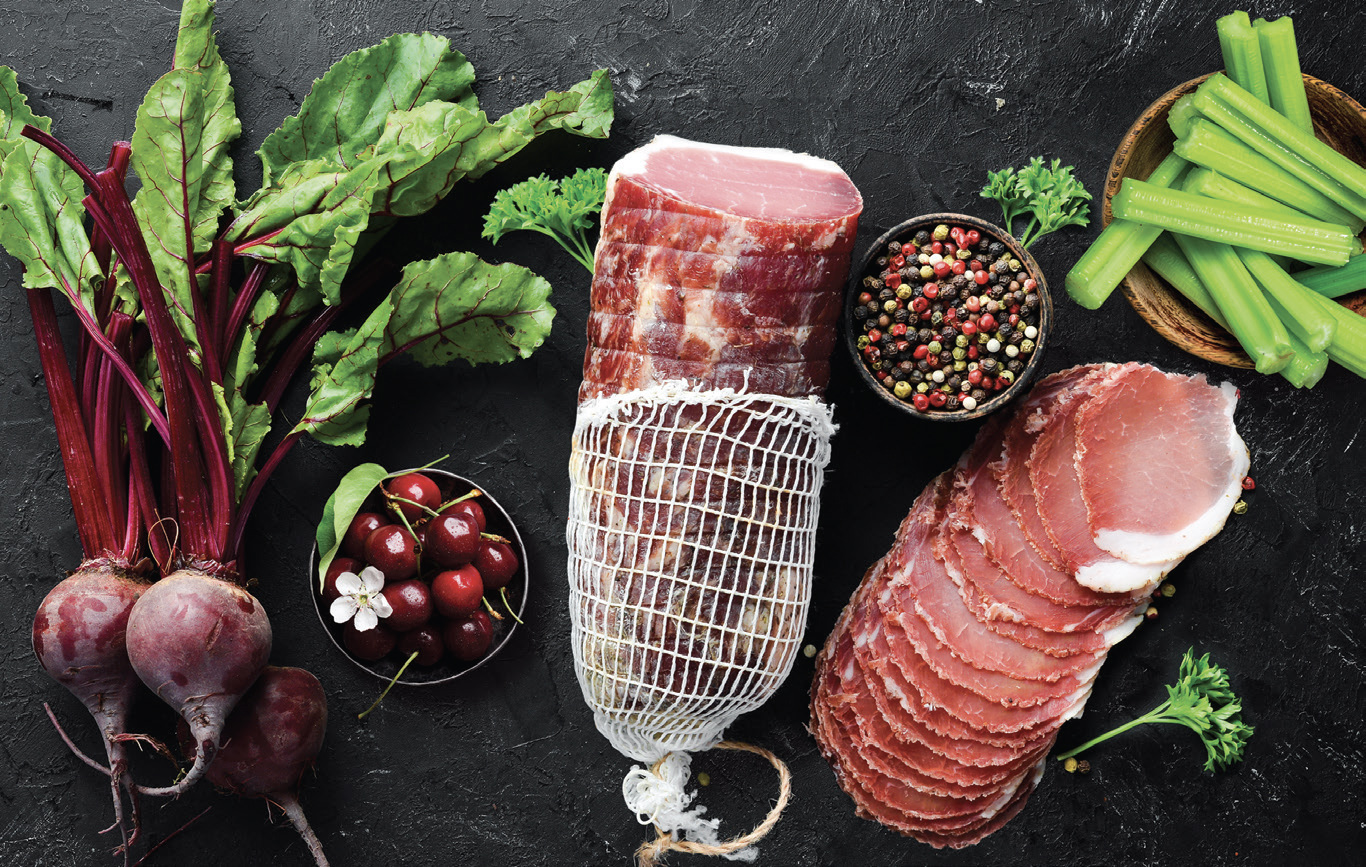Wenda Ingredients Launches New Solution to Intensify Meaty Taste & Juiciness
Introducing HyBind PR3 a true phosphate replacer versatile across meat types. Naturally enhance yield and texture.
Read
Dispelling Myths, Engaging Consumers with Meats Cured with Plant-Based Ingredients
“Oh, I don’t eat cured meats, only plant-based foods because nitrites are bad.”
“Does that have nitrites? I only buy uncured.”
Such sentiments are all too common – and all too incorrect.
Misperceptions about nitrates and nitrites in meat have circulated a long time, starting with those who took issue with processed meats decades ago and continuing today, with a lingering eat-this, not-that, halo vs. pitchfork kind of reactionary mindset.
“What you’ve been told the last 50 years is wrong,” declares Dr. Nathan Bryan of Baylor College of Medicine in Houston, an internationally recognized expert on nitric oxide for human health. “The body of evidence is overwhelming in terms of risk versus benefit of nitrites.” Dr. Bryan was the first to describe nitrate and nitrite as indispensable nutrients required for optimal cardiovascular health and the first to demonstrate and discover an endocrine function of nitric oxide via the formation of S-nitrosoglutathione and inorganic nitrite.
Likewise, Dr. Joseph G. Sebranek, distinguished professor in Agriculture and Life Sciences and Morrison Endowed Chair in the Department of Animal Science and Department of Food Science and Human Nutrition at Iowa State University who has researched and written extensively on this topic, agrees that falsehoods have endured for too long. “There is a very common perception among many people that nitrates, nitrites and cured meat are hazardous to human health. This is a myth that has been circulated and re-circulated since the 1970s and just doesn’t go away. Fortunately, in the last 25 years or so, a very different story has been developing as a result of a great deal of research showing that nitrate and nitrite are positive contributors to human health and may even be necessary for good health. This side of the story has not received the degree of attention that it deserves,” he says.
“Within the last several decades, the profound importance of nitric oxide (and its oxidative products nitrite and nitrate) in many physiological systems has been established. Dietary consumption of nitrite has been demonstrated in clinical studies to have numerous health benefits, especially related to improved cardiovascular function. Media coverage of these studies has resulted in consumers eschewing nitrate and nitrite in some foods while embracing other foods (such as beet juice) precisely because they contain nitrate.”
— From the paper, “Dietary Nitrate and Nitrite: Benefits, Risk, and Evolving Perceptions” by Wendy Bedale, Jeffrey J. Sindelar, Andrew Milkowski, published in Meat Science, Feb. 2016
Influenced by erroneous impressions via published reports, media coverage or grapevine conversations, many consumers have avoided certain foods like cured meats because they’ve heard those items are bad for them. The stigma is exacerbated by “Uncured” labeled products that claim to be healthier because they “don’t contain nitrates or nitrites”. These “Uncured” labeled meats are still cured with plant-based ingredients such as beet, celery, cherry, swiss chard and more. However, this misleading label unfortunately promotes cured products as not as healthy.
Even global health groups perpetuate myths. When health organizations issue misleading guidance that burnt meats are unhealthy based on the presence of nitrosamines and heterocyclic amines, they’re not sharing the full picture; namely, that any burnt food has the same issue, including plant-based foods.
Dr. Bryan has heard all of it. “I lecture all over the world and at about 80 percent of my lectures, people will ask, ‘Do you eat bacon?” or ‘What about hot dogs?’” he says. “Then I’ll say, ‘What if I told you that the benefits of a vegetarian diet are based on the content of nitrates and nitrites?’ It blows their mind that vegetarian diets have nitrates and nitrites, and it changes the dynamics of the conversation.”
While sweeping generalizations (at best) and incorrect health advice (at worst) have been embedded in people’s mindsets, science supports the functionality and health benefits of nitric oxide formed by nitrates and nitrites. That science spans cell biology and epidemiology that dispel the wrong beliefs about cured meats and confirm the fact that nitrites in meat actually play an important role in improving health.
Discerning science-based truths starts with the definitions.
• Nitrates, comprised of one nitrogen atom and three oxygen atoms, are often used to preserve food or as an additive. Functionally, they enhance flavor and can prevent bacteria growth. Vegetables also contain nitrates, from the nitrogen in soil and fertilizers.
• Nitrites, with one nitrogen atom and two oxygen atoms, facilitates the nitroso-hemochrome color (pink pigment) we all recognize in cured meat and poultry.
• The link: Nitrates turn into nitrites when they encounter certain bacteria and enzymes. In turn, dietary nitrites form nitric oxide which further creates the nitroso-hemochrome cured color.
Nitric oxide has been called the “miracle molecule”, and for good reason. “Nitric oxide has been shown to be especially important to cardiovascular health because nitric oxide relaxes and dilates blood vessels to result in improved blood pressure. It has also been determined that as we grow older, our natural enzyme system produces less nitric oxide, which puts us at risk for increased blood pressure and cardiovascular disease. This is where dietary sources of nitrite and nitrate can be important because diet can provide a supplementary source of nitric oxide, and this has been confirmed in several studies,” explains Dr. Sebranek.
In fact, one team of scientists received the Nobel Prize in Physiology or Medicine of 1998 for their work showing nitric oxide has positive benefits on the cardiovascular system.
The nitrite in meat is irreplaceable in producing nitric oxide. There are other benefits of nitrites found in meat, too, including microbial protection against pathogens like listeria and clostridium. Dr. Sebranek underscores the fact that nitrite in meat also provides preservation, flavor and color, and can’t be replaced, summing it up this way: “It’s magic.”

The miracle molecule of nitric oxide and the irreplaceable nitrite in meat open the door to permissible consumption, including longtime favorite products like meat snacks as well as other cured meat products.
The key is to provide clean-label consumers with meat and poultry options made with naturally occurring nitrates and nitrites from plant-based sources.
By curing meats with naturally occurring nitrites from celery powder, beet powder, or another plant-based nitrite source, in addition to an accelerator such as cherry powder, a meat or poultry company can give consumers what they’re craving: good taste with positive health benefits. There are important definitions in cured meats, too: cured meats are either cured with sodium nitrite and erythorbate or with fruit-based and plant-based naturally occurring nitrates and nitrites. There is no such thing as a true, “uncured” product which still has the nitroso-hemochrome color (cured). Varying levels of nitrates and/or nitrites may have been used in the production process, but still always, nitrates and nitrites.
Instead of being concerned with stigmas about cured products stemming from outmoded and incomplete information, manufacturers and processors can tout the benefits of foods cured with naturally-occurring nitrites in beet and celery powder. “Meat companies don’t have to hide behind it – they can lead with it. That’s where the market is going,” suggests Dr. Bryan.
Indeed, the clamor for beet root powder and beet juice containing important nitric oxide continues to grow, from workout enthusiasts to the wellness-minded consumer. One just has to look at Amazon’s website, which lists more than 1,000 product SKUs for just “beet powder” and growing.
Switching from defense to offense shuts down misconceptions and encourages the development of products that are – and that can be marketed as – better-for-you. “Just as many foods are fortified with iron, folate or B vitamins because it is clear that many Americans are deficient, we now have the opportunity to fortify foods, including meat with a standardized amount of nitrite that can provide additional health benefits to the consumer,” Dr. Bryan explains. “This concept is already accepted by millions who buy beet root powder and fermented beet root powder standardized to nitrate and nitrite content as a pre-workout supplement.”
“From long-term epidemiological studies down to sub-cellular molecular biology, nitrite is safe and effective but also required for health and wellness.”
– Dr. Nathan Bryan
 You can have your cured meat and eat, it, too.
You can have your cured meat and eat, it, too.
Today’s consumers want clean ingredients, as they focus on health and wellness. Beet powder, celery powder and cherry powder fit the bill for clean ingredients that provide an important function in curing meat products with helpful nitrite and vitamin C (ascorbic acid). Wenda Ingredients offers innovative ingredient solutions:
Even as today’s consumers increasingly embrace plant-based foods, they still love meat products.
There is a wide range of meat products cured with plant-based nitrites to give consumers what they want from a taste and health standpoint. SafePlate® Beet Powder 300 and SafePlate® Celery Powder for example, are used in bacon, hot dogs, sausage, ham, deli meats, beef jerky, canned food, dry-cured meat, poultry and sous vide cooked meats.
Meat snacks are one example of a trending application. In an era of keto and high-protein diets, meat snacks remain popular among consumers, and providing better-for-you options sets a brand apart. “There is an opportunity for processors to inform consumers the health benefits of nitrite and nitric oxide. This, coupled with the trends of snacking, gives processors the huge advantage of producing meat snacks that engage healthy-minded consumers with health benefits of nitric oxide,” remarks Dr. Bryan, adding that a brand can promote the fact that the product is made with naturally occurring nitrites from beet powder or celery powder.
Meat products cured with beet powder, celery juice powder and cherry powder can – and should – be marketed from both a taste and health standpoint. Consumers want to know how to improve their cardiovascular health and overall wellness, which is why beet powder in other forms has been in demand in recent years. Sharing the benefits of the “miracle molecule” of nitric oxide and the inclusion of beet powder and celery powder, captures the interest of health-minded consumers – and ultimately helps processors and their retail and foodservice customers capture more sales.
Learn More about SafePlate® Beet, Celery, and Cherry Powders:
Suggested book found on Amazon: Functional Nitric Oxide Nutrition: Dietary Strategies to Prevent and Treat Chronic Disease